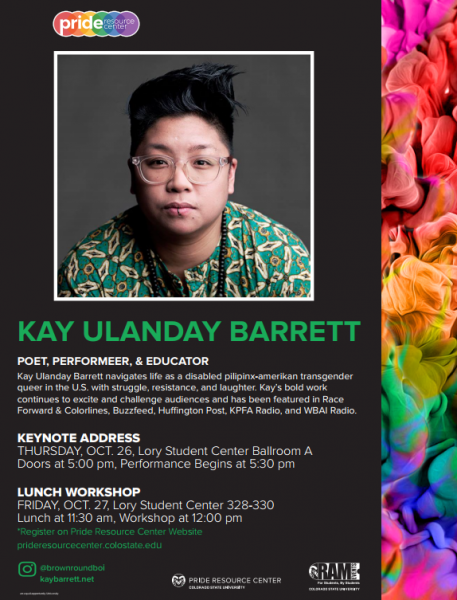Tonight, Kay Ulanday Barrett will be on-campus as the keynote speaker for CSU’s on-campus LGBT Month celebrations, coordinated by the Pride Center. Door open at 5pm and Barrett speaks at 5:30pm in the Lory Student Center’s Ballroom A. Friday, Oct 27, a lunch workshop will follow Barrett’s talk. The lunch will be held in the LSC, room 328-330 starting at 11:30am.
Barrett has become a powerful voice for many minority groups. On their website, Barrett explains his intersection as “multi-talented brown trans disabled artist.” Barrett takes on many roles, including poet, performer, cultural worker, food blogger, and educator.
Barrett was born in Michigan and began writing poetry at a young age. He then received his undergraduate degree from DePaul University where he double-majored in Women’s and Gender Studies and Political Science. In 2002, Barrett began sharing his poetry, using that platform to touch on the intersectionality of his different identities.
In an interview with NYLON, Barrett acknowledges that “maybe I’m not in a mainstream magazine per se, but I’m honoring the way my communities look. There are all the movements by Trans People of Color, Gender Non-Conforming People of Color, Trans Femmes of Color engaging in a body politic so that there’s a future.”
This idea of body politic is something that is important for the LGBT community, and is reinforced when people like Barrett raise awareness about issues of race, disability, and sexuality. These intersections continue to appear in Barrett’s poetry and activist work.
In an interview with Apogee about his new collection of poetry called When the Chant Comes (2016), Barrett explained that “There’s no manual for children of migrants with class struggles whose parents died from the excruciating effects of the U.S. empire…There’s something to say when you carry the memories when others have gone beyond and aren’t breathing with us.”
Barrett uses their poetry as a tool for change. As he continues in this interview, “I want to check-in via poetry with my readers and with my ancestors, to make sure we’re moving together.”
If you want to learn more about this new poetry collection, you can find his interview on Apogee’s website.
In closing, as Barrett reminds us, “It takes work to be who you are authentically in this world.”
